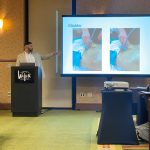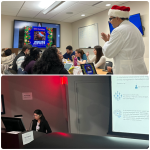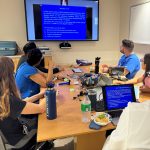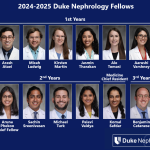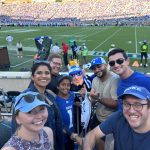Pager sign in
SIGN IN TO PAGER:
- ACUTE PAGER: 919-970-7746,*#7746#,1,5,1, YOUR PAGE NUMBER (last 7 digits)
- DCT PAGER: 919-206-8575,*#,1,5,1, YOUR PAGE NUMBER (last 7 digits)
- FLOOR PAGER: 919-970-9451,*#,1,5,1, YOUR PAGE NUMBER (last 7 digits)
- TRANSPLANT PAGER: 919-970-3339,*#,3339#,1,5,1, YOUR PAGE NUMBER (last 7 digits)
SIGN OUT TO SPIN
- ACUTE PAGER: do nothing, night float will sign into this pager as above method
- DCT to SPIN PAGER: 919-206-8575,*#,1,5,1, 9707746
- FLOOR to SPIN PAGER: 919-970-9451,*#,1,5,1, 9707746
- TRANSPLANT to SPIN PAGER: 919-970-3339,*#,3339#,1,5,1, 9707746
Epic Template Notes
| Type of Note | dot phrase |
|---|---|
| general consult for AKI | .nephaakiconsult |
| general consult for hyponatremia | .nephhyponatremia |
| general consult for dialysis | .nepheeskdconsult |
| general consult for PD | .nephpdconsult |
| transplant consult | .nephtxp |
| general progress note | .nephpprog |
| progress note with CRRT elements added | .nephprogcrrt |
Weekend signout template developed for ALL teams including APPs
Template for sign-out on the “To Do (Nephrology)” section on Epic. To include the following:
| – See or Chart check (for weekends), THIS IS LISTED FIRST |
| – If chart check: what is the specific thing to look for |
| – One word diagnosis (ESKD on HD, lupus nephritis, AKI, Hyponatremia etc)*** |
| – Reason for Admission (which could be different… pneumonia, MI, leg infection, UTI) |
***DO NOT include full one liner that includes age, sex, all of diagnoses. This should be VERY BRIEF.
Duke Central Tower (DCT) Consult Service

Pager is 919-206-8575 (click here for info on how to change pager coverage). Geographically restricted to patients admitted to the Duke Central Tower. This will be a mix of patients (ICU and floor consults). It will be staffed by an attending +/- fellow. Attending and fellows will not work on weekends while on the DCT Service. Will not cover maintenance dialysis, those will be on the maintenance service. Will not cover transplant.
- The DCT tower will see patients on 7100 and 7300
- Will not cover maintenance patients in DCT
- will cover unassigned non maintenance patients in the ER when a fellow is on service
- will cover patients on PD
- Attending on DCT who does not have weekend call at Duke will round on DCT on Sunday
Duke Hospital North (DN) Floor Service

Pager is 919-970-9451 (click here for info on how to change pager coverage). Consultative support to patients admitted directly to the general medicine wards at Duke University Hospital North except those on maintenance kidney replacement therapy (they will be on the Dialysis Service) or with a kidney transplant (Transplant Service).
- DCT to cover 7100 and 7300
- Saturday Floor fellow will cover their own floor patients
- in addition they will cover the DCT patients
- will do short call on Saturday
- Attending on DCT who does not have weekend call at Duke will round on DCT on Sunday
Duke Hospital DN Dialysis Service
This is a non teaching service taking care of patients with established hemodialysis.
- The APPs on Duke North Dialysis Service will do completed the initial consult on established maintenance hemodialysis patients admitted through the ER without an assigned bed. After bed assignment they will be transferred to the appropriate team based upon geography.
- Will cover maintenance dialysis patients to all patients not in the ICU
Duke Medicine Pavilion (DMP) Acute ICU Service

Pager is 919-970-7746. Covering all patients in the DMP included 6E and 8E. The service is staffed by a nephrology fellow, medicine resident, advanced practice provider, and any medical students assigned by the School of Medicine. The service evaluates all patients residing in ICUs at Duke University Medical Center requiring nephrology consultation with the exceptions of patients with a kidney and/or pancreas transplants. Problems frequently encountered include acute kidney failure in critically ill patients, nephrotic syndrome, resistant hypertension, complex fluid, electrolyte and acid-base disorders, and patients on maintenance dialysis admitted to the ICU. Interventional and consultative support (including CVVHDF) for patients in the intensive care units at Duke University Hospital except patients with a kidney transplant. Team includes a rounding physician extender (PA or NP). The service is restricted to the Duke Medicine Pavilion (DMP)
An attending physician conducts formal teaching rounds Mondays through Fridays. During teaching rounds, the consultations are presented, the differential diagnoses discussed, and the plans for evaluation and treatment discussed. The cases are therefore used as conduits for teaching. In addition, follow-up plans are discussed for all patients followed by the service. The advanced practice provider on service usually covers all patients residing in the 7West cardio-thoracic ICU.
- APP will cover CTICU (7W) as well as 6E and 8E. However, it is at the discretion of the DMP service attending how to deploy the members of the DMP team if numbers are not equitable.
- Sunday DMP ICU fellow will cover their own ICU patients
- in addition they will cross-cover the Floor patients unless the attending who is on call was on the Floor the preceding week in which they will cover the DCT.
Duke Transplant Service
Pager is 919-970-3339 (click here for info on how to change pager coverage). The Transplant Service is a fully consultative service that assists in the management of all kidney/pancreas transplant patients in the hospital. Transplanted patients are cared for by the Surgery Transplant Service, which is staffed by a surgical attending, a surgery advanced practice provider, a transplant surgery fellow, an upper level surgical resident and/or surgical intern, a transplant pharmacist, a transplant coordinator, and a transplant case manager. We provide consultative service to assist with immunosuppression (induction & maintenance), electrolyte & fluid management, dialysis if needed, blood pressure & blood sugar control, kidney biopsies, and other medical problems. Transplant patients further out (typically a year or more) with primary medical problems, including acute cellular & antibody mediated rejection, are admitted to the General Medicine Service. We provide consultative assistance in the management of these patients. If you get consulted by ER for disposition of a transplant patient, in general transplants less than a year out should go to transplant surgery (ER must consult general surgery to be accepted by transplant surgeon) unless admission is not related to transplant complication.
Continuity of care is provided in the Abdominal Transplant Clinic (Duke Clinic, 2C) in which post-transplant patients and pre transplant, return patients are seen in the morning, while and pre transplant, new patient evaluations are seen on Tuesday, Thursday and Friday afternoons. In these clinics, the Nephrology Transplant Fellow will see patients alongside and with the help of the Transplant Nephrology Attending.
The Focus of the post-transplant, return visits is to:
- understand the impact of wanted (reduce rejection risk) & unwanted (infection & other side effects) effects of immunosuppression
- gain experience with wound care & healing
- manage medical problems seen in post-transplant patients (side effects of medications, diabetes, blood pressure, mental health & other social issues, etc).
The evaluation of pre transplant patients (both new & return) will focus on
- understanding the factors that impact a patient’s ability to safely undergo a kidney &/or pancreas transplant at our center
Weekend
- Will over short call on Sunday
How to access the patient calendar on Epic
Steps to see Patient Calendar:
- Go to Summary Tab
- Click Index-MD
- Under Additional Reports, choose Patient Calendar

Responsibilities of the Nephrology Fellow on Duke services include:
- Provide consultation for all patients in Duke Hospital. Prompt service, either alone or in conjunction with the resident or medical student, should be given to consultation requests from the intensive care units and from the Emergency Department. In general, patients in the intensive care units and in the Emergency Department should be evaluated within one hour and presented to the attending physician within four hours of the consultation request.
- Provide timely hemodialysis therapy. Patients who require hemodialysis should be identified as early in the day as possible (after consultation with the nephrology attending or fellow) and their names and locations given to the charge nurse. Hemodialysis orders should be written so that hemodialysis may commence by 8 AM.
- All hemodialysis orders at Duke must be written in Maestro. It is the responsibility of the fellow or resident to obtain written consent for hemodialysis on each patient admitted who needs dialysis. Patients must be consented to receive dialysis at the beginning of each hospitalization. This written consent must be on patient’s chart before dialysis can be initiated. Hemodialysis may not be initiated unless hemodialysis orders have been written.
- Fellows and medical residents may place temporary hemodialysis catheters in the femoral vein and internal jugular veins under the supervision of the attending. Once proficiency has been documented, the fellow may place lines independently.
- Supervision of the resident. As time allows, the fellow should review consultations performed by the resident before formal presentation to the attending physician.
- Supervision and teaching of the medical students. The fellow should evaluate all consultations performed by the medical students before formal presentation to the attending physician.
- Provision of adequate follow-up for patients following discharge from hospital. Patients may be seen in the Duke Outpatient Clinic by an attending physician or by a fellow. In the event that a patient is followed by a nephrologist elsewhere, the fellow will be responsible for calling the nephrologist to describe the patient’s hospital course and any need for further intervention. To set up outpatient nephrology clinic, email Tracie Bach (tracie.bach@duke.edu) especially if you are trying to schedule with a particular nephrologist
- After hours and weekend “on call” duty for Duke Hospital and the VA as scheduled
- Examination of the urine sediment in all cases of acute kidney injury. Examination of the urine sediment may or may not be indicated in cases of chronic kidney disease. This skill should be taught to the resident and medical student.
- Attendance at Journal Club on Thursday mornings 8:30 AM – 9:30 AM.
- Attendance at Grand Rounds on Friday mornings 9:00 AM – 10:00 AM.
- Attendance at Core Curriculum Lecture Series on Wednesdays from noon to 1:00 PM
- Review of all kidney biopsy specimens obtained by the fellow with the pathologist and attending nephrologist.
- Attendance at teaching rounds Mondays through Fridays.
- Attendance at attending rounds on weekend days according to the schedule.
Transplant Fellow Responsibilities:
- Pre round on all consult patients in the intensive care units or any floor patients for whom decisions regarding kidney replacement therapy need to be made. These rounds precede multidisciplinary transplant rounds with the surgeons (see below). Discuss pre-rounding on other surgical patients with attending.
- Participate in daily, AM multidisciplinary rounds with the surgeons (9:00 AM, starting on 2300)
- Provide temporary vascular access (vascath) for dialysis in coordination with the surgery or medicine team(s) as needed.
- Make dialysis arrangements during hospital stay and at discharge; provide follow up to the outpatient dialysis units/providers regarding discharged patients.
- Evaluate and follow all kidney/pancreas consults (any location in the hospital); patients must be presented to the attending within 24 hr.
- Perform all native & transplant kidney biopsies as indicated on in & outpatients with the attending on service.
- Attend own continuity clinics and at least one AM return patient clinic AND one PM new patient, referral clinic EACH WEEK while on service.
- Attend Journal Club on Thursday mornings 8:30 AM – 9:30 AM.
- Attend Grand Rounds on Friday mornings 9:00 AM – 10:00 AM.
- Attend Core Curriculum Lecture Series Lecture Series on Wednesdays from noon to 1 PM
- Attend monthly Transplant Morbidity and Mortality Conference each third Wednesdays, 4 PM, Hanes Rm. 302.
Defining the Role of the General and Transplant Nephrology Fellows on Service Together.
(Rough Starting Guidelines – subject to change by fellows/attendings on service)
- Sunday Night: The Transplant Fellow sends an email to the General Fellow dividing patients with the following general philosophy:
- Transplant Fellow – covers most (not necessarily all) of the ‘on-service’ patients on Mondays (exchange between fellows is certainly welcome for continuity or to equalize the census.
- General Neph Fellow – covers most (not necessarily all) ‘off’ service patients on Mondays (as above, exchange of patients is welcome)
- New consults: These get distributed equally 1:1, alternating Gen-Fellow/Txp-Fellow, allowing for modifications based on the relative census and who is in clinic, and with emphasis on distribution philosophy above.
- Clinic days:
- Fellow in a morning clinic ‘pre-rounds’ on their patients (those that need pre-rounding, others may be seen by the fellow after clinic) and lets the other fellow know if there are any issues that need coverage while they are in clinic. After clinic, the fellows connect to run the list and distribute remaining/pending consults.
- Fellow in afternoon clinic sees all their patients and ’signs out’ any issues that need coverage in the afternoon. After clinic, the fellows run the list to prepare for the next day.
- The Fellow without clinic covers new consults, follows up on issues they receive in sign-out, and any issues that arise while the other fellow is in clinic. As above, fellows to run the list after clinic.
- Day Time Questions and/or Calls Overnight:
- General Fellow’s first call is the Transplant Fellow with questions during the day and at night….
- The transplant fellow then calls the attending for input…
- The Txp Fellows gets back to the General Fellow with an answer/plan.
- The General Fellow is ALWAYS welcome to call the attending directly (ALWAYS) if they are uncomfortable going through the Transplant Fellow (or if the Transplant Fellow is occupied).
- Saturdays when the Transplant Fellow is Rounding:
- On the Saturday when the transplant fellow is in the hospital, the transplant fellow signs on to the transplant call pager until they leave Saturday afternoon.
- The Transplant Fellow takes primary responsibility for the ‘off-service’ patients (note writing, etc.) and attends rounds as possible.
- The Transplant Fellow sees new transplant consults that come in early in the day.
Note: These are starting guidelines. If there is mutual agreement, Fellows and Attendings can come up with a different work-flow if it works better day-to-day or week-to-week. The fellows’ roles should be articulated clearly.





















